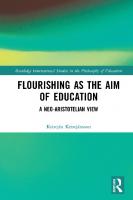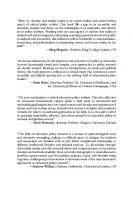Concerning the Aim and Method of Education 1410200388
108 20 27MB
English Pages 263 Year 2002
Recommend Papers
File loading please wait...
Citation preview
Desideri us Erasmus concerning
the Aim and Method of Education
by
WILLIAM HARRISON WOODWARD Professor of Education in the University of Liverpool Author of //ittorino da Feltre
I,,,
University Press of the Pacific Honolulu, Hawaii
. �:: •,-,•
I ,_,,_\ \
Desiderius Erasmus: Concerning the Aim and Method of Education
by William Hanison Woodward ISBN: 1-4102-0038-8Copyright© 2002 by University Press of the Pacific Reprinted from the 1904 edition University Press of the Pacific Honolulu, Hawaii http://www.universitypressofihepacific.com All rights reserved, including the right to reproduce this book, or portions thereof, in any fonn. In order to make original editions of historical works available to scholars at an economical price, this facsimile of the original edition of 1904 is reproduced from the best available copy and has been digitally enhanced to improve legibility, but the text rem ains unaltered to retain historical authenticity. . ;··:� ...i . -,_·•,ii,;•.',·,·_.·�,l1 __,· ,.-_-_ ·--�--, ;:_�:_:_ 1; , .. · i • : · .- :_� l l .� _ '-' • ·�----;1
PREFACE.
T
HE scope of the present study of Erasmus is defined by its title. I have directed attention to one aspect only of his work and personality. That aspect of Erasmus is of profound importance. Indeed it may be reasonably maintained that of all his activi ties none was more congenial to him, none more characteristic, none of more influence in his own age and subsequently than that which was concerned with Education. Yet although the limitations of the subject have not been lost sight of, it has been, from the nature of it, necessary to take a wider view of the attitude of Erasmus to the problems of his time than a hasty reading of the title of this book might suggest. For it is obviously impossible to understand and to present aright the Erasmian ideal of the fit training of the young unless the presuppositions upon which it rests are duly examined. Thus a brief historical review of the literary life of Erasmus was called for, though it seemed well to make clear the limits of the purpose for which it was compiled. Much that fills so large
Preface
VI
a space in the approved biographies of
Erasmus has
been in effect ignored, as but remotely affecting the subject of this enquiry.
On the other hand I have
endeavoured to realise with precision the appeal which Antiquity made to Erasmus and the message which he Compared believed it to convey to the modern wor1d. with this his share in the Lutheran conflict seems to me to be, in a serious appraisement of
Erasmus, as
unimportant as it was to hfmself distasteful. The deepening interest in educational enquiry which marks the present time will, we may confidently hope, extend to the study of the aims and achievements of the educators of the past.
Next to the great
Italian
Masters of the Quattrocento Erasmus makes c1aim for serious recognition.
The actual degree of his influence
in Germany and England it is difficult to assess, and writers have differed in their judgments.
But if it
should be provable that Erasmus left less direct impress upon school organisation or methods than certain of his contemporaries, the reason will be found in the fact that he was on crucial points so far in advance of public opinion, that he took so wide, so truly humanist, a view of the scope of education that in the troubled times of sectarian partisanship his day was not yet.
In certain
regards we must feel as we study such a work as the
De Pueris statim ac liberaliter instituendis, contained in English dress in the present volume, that he speaks with a n�te unexpectedly "modern." therefrom the depth of
As we realise
Erasmus' conviction
of
the
respect due to the rights of the child we understand, what we may have already suspected, how far a prevalent
Preface type of criticism of Humanist methods has been based upon ignorance of the facts. It is indeed of the first importance that the student of the history of educational thought should be led to acquaintance at first hand with the men whose doctrines are under discussion. Only upon this condition can the study of the subject be regarded as worthy of serious recognition as an aspect of literary and historical enquiry. In the study of Erasmus the text is the first, the second and the third authority: and I have built up my exposition upon repeated readings of the treatises, prefaces, and letters pertinent to the subject. The range of Erasmian literature is notoriously immense. To distinguish the works which have proved specially prolific of suggestion is scarcely possible. But two may be here singled out as of first rate importance to students of Erasmus. The Letters of Erasmus by Mr F. M. Nicholls carries down the correspondence to I 509: a second volume which is, I am glad to know, to appear very shortly, will include the year IS I 7. The correspondence of Erasmus so far as it is of bio graphical interest-in a very wide sense-is presented in an English version, with most careful apparatus of preface and note. Without necessarily accepting every disputed attribution or date, I can affirm that no more valuable aid to the understanding of Erasmus down to the Cambridge period has yet seen the light, whether in this country or in Germany. The second work to which allusion is made is the analysis of the psycho logical presuppositions of Erasmus' educational doctrine a 5
Preface
Vlll
of Dr Hermann Toge], Die piidagogischen Anschauungen des Erasmus in ilzrer psyclzologischen Begriindung. The author, however, is prone to see everything in terms of Herbartianism, to the detriment of his historical per ception. I desire to express my obligations to Miss May Allen, Mr John Sampson, University Librarian, and Mr E. Gordon Duff, for �ind assistance at different stages of my work. Miss Allen has been particularly he] pful in the bibliographical section.
THE UNIVERSITY, LIVERPOOL, Februaty 1, 1904.
CONTENTS. PAGE
PREFACE
V
CHRONOLOGICAL OUTLINE
XI
PART I. CHAP. AN OUTLLNE OF THE LIFE OF ERASMUS I. I I.
CHARACTERISTICS.
§
I.
� 2.
!, I I I.
IV.
Erasmus and Antiquity The Reconciliation of the Antique with the Christian Spirit Erasmus and the Ciceronians Erasmus and the Vernacular Tongues
THE EDUCATIONAL AIM OF ERASMUS. The General Purpose of Education � I. § 2. The Three Factors of Human Nature S 3. Limitations of the Educational Ideal THE BEGINNINGS OF EDUCATION. § I. Earliest Care . .










